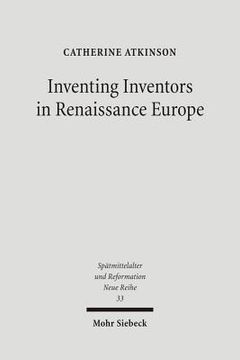Share
Inventing Inventors in Renaissance Europe: Polydore Vergil's 'de Inventoribus Rerum'
Catherine Atkinson
(Author)
·
Mohr Siebeck
· Hardcover
Inventing Inventors in Renaissance Europe: Polydore Vergil's 'de Inventoribus Rerum' - Atkinson, Catherine
£ 128.21
£ 142.46
You save: £ 14.25
Choose the list to add your product or create one New List
✓ Product added successfully to the Wishlist.
Go to My WishlistsIt will be shipped from our warehouse between
Tuesday, July 09 and
Thursday, July 11.
You will receive it anywhere in United Kingdom between 1 and 3 business days after shipment.
Synopsis "Inventing Inventors in Renaissance Europe: Polydore Vergil's 'de Inventoribus Rerum'"
Polydore Vergil of Urbino (ca.1470-1555) fired his readers' imagination with his encyclopaedic book On the inventors of all things ( De inventoribus rerum 1499). His account of the manifold origins of sciences, crafts and social institutions is a praise of man's inventive genius and a prototypical cultural history. Polydorus was a household name for several centuries. Erasmus envied his friend the book's success, Rabelais heaped scorn on it, Catholic censors put it on the index, while Protestants were fascinated with that papist work. In this first in-depth study of the Renaissance 'bestseller', Catherine Atkinson examines not only the Italian humanist's bona fide (mostly ancient) inventors, in books I-III, she enquires into the neglected and misunderstood, yet equally important, books IV-VIII (1521). This early modern text, written on the eve of the Reformation, is devoted to the highly controversial topic of the 'invention' of ecclesiastical institutions. The priest and humanist Vergil, who during his 50 years in England rose in the church hierarchy, is shown to be an acute observer of contemporary religious practice. He employs the inventor question (who was the first to do this?) as an instrument of historiography and by comparing medieval church rites and institutions with religious practice of antiquity, implicitly questions the singularity of the Christian church.
- 0% (0)
- 0% (0)
- 0% (0)
- 0% (0)
- 0% (0)
All books in our catalog are Original.
The book is written in English.
The binding of this edition is Hardcover.
✓ Producto agregado correctamente al carro, Ir a Pagar.

